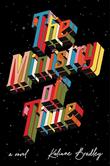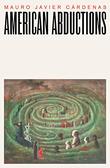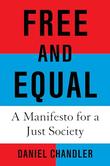
by James McBride ‧ RELEASE DATE: Aug. 8, 2023
If it’s possible for America to have a poet laureate, why can’t James McBride be its storyteller-in-chief?
Awards & Accolades
Likes

31
Our Verdict

GET IT
Kirkus Reviews'
Best Books Of 2023
Kirkus Prize
winner
New York Times Bestseller
McBride follows up his hit novel Deacon King Kong (2020) with another boisterous hymn to community, mercy, and karmic justice.
It's June 1972, and the Pennsylvania State Police have some questions concerning a skeleton found at the bottom of an old well in the ramshackle Chicken Hill section of Pottstown that’s been marked for redevelopment. But Hurricane Agnes intervenes by washing away the skeleton and all other physical evidence of a series of extraordinary events that began more than 40 years earlier, when Jewish and African American citizens shared lives, hopes, and heartbreak in that same neighborhood. At the literal and figurative heart of these events is Chona Ludlow, the forbearing, compassionate Jewish proprietor of the novel’s eponymous grocery store, whose instinctive kindness and fairness toward the Black families of Chicken Hill exceed even that of her husband, Moshe, who, with Chona’s encouragement, desegregates his theater to allow his Black neighbors to fully enjoy acts like Chick Webb’s swing orchestra. Many local White Christians frown upon the easygoing relationship between Jews and Blacks, especially Doc Roberts, Pottstown’s leading physician, who marches every year in the local Ku Klux Klan parade. The ties binding the Ludlows to their Black neighbors become even stronger over the years, but that bond is tested most stringently and perilously when Chona helps Nate Timblin, a taciturn Black janitor at Moshe’s theater and the unofficial leader of his community, conceal and protect a young orphan named Dodo who lost his hearing in an explosion. He isn’t at all “feeble-minded,” but the government wants to put him in an institution promising little care and much abuse. The interlocking destinies of these and other characters make for tense, absorbing drama and, at times, warm, humane comedy. McBride’s well-established skill with narrative tactics may sometimes spill toward the melodramatic here. But as in McBride’s previous works, you barely notice such relatively minor contrivances because of the depth of characterizations and the pitch-perfect dialogue of his Black and Jewish characters. It’s possible to draw a clear, straight line from McBride’s breakthrough memoir, The Color of Water (1996), to the themes of this latest work.
If it’s possible for America to have a poet laureate, why can’t James McBride be its storyteller-in-chief?Pub Date: Aug. 8, 2023
ISBN: 9780593422946
Page Count: 400
Publisher: Riverhead
Review Posted Online: May 9, 2023
Kirkus Reviews Issue: June 1, 2023
Share your opinion of this book
More by James McBride
BOOK REVIEW
BOOK REVIEW
BOOK REVIEW
More About This Book
PERSPECTIVES
PERSPECTIVES

by Kristin Hannah ‧ RELEASE DATE: Feb. 6, 2024
A dramatic, vividly detailed reconstruction of a little-known aspect of the Vietnam War.
Awards & Accolades
Likes

67
Our Verdict

GET IT
New York Times Bestseller
A young woman’s experience as a nurse in Vietnam casts a deep shadow over her life.
When we learn that the farewell party in the opening scene is for Frances “Frankie” McGrath’s older brother—“a golden boy, a wild child who could make the hardest heart soften”—who is leaving to serve in Vietnam in 1966, we feel pretty certain that poor Finley McGrath is marked for death. Still, it’s a surprise when the fateful doorbell rings less than 20 pages later. His death inspires his sister to enlist as an Army nurse, and this turn of events is just the beginning of a roller coaster of a plot that’s impressive and engrossing if at times a bit formulaic. Hannah renders the experiences of the young women who served in Vietnam in all-encompassing detail. The first half of the book, set in gore-drenched hospital wards, mildewed dorm rooms, and boozy officers’ clubs, is an exciting read, tracking the transformation of virginal, uptight Frankie into a crack surgical nurse and woman of the world. Her tensely platonic romance with a married surgeon ends when his broken, unbreathing body is airlifted out by helicopter; she throws her pent-up passion into a wild affair with a soldier who happens to be her dead brother’s best friend. In the second part of the book, after the war, Frankie seems to experience every possible bad break. A drawback of the story is that none of the secondary characters in her life are fully three-dimensional: Her dismissive, chauvinistic father and tight-lipped, pill-popping mother, her fellow nurses, and her various love interests are more plot devices than people. You’ll wish you could have gone to Vegas and placed a bet on the ending—while it’s against all the odds, you’ll see it coming from a mile away.
A dramatic, vividly detailed reconstruction of a little-known aspect of the Vietnam War.Pub Date: Feb. 6, 2024
ISBN: 9781250178633
Page Count: 480
Publisher: St. Martin's
Review Posted Online: Nov. 4, 2023
Kirkus Reviews Issue: Dec. 1, 2023
Share your opinion of this book
More by Kristin Hannah
BOOK REVIEW
BOOK REVIEW
BOOK REVIEW
More About This Book
PERSPECTIVES
BOOK TO SCREEN

by Leigh Bardugo ‧ RELEASE DATE: April 9, 2024
Lush, gorgeous, precise language and propulsive plotting sweep readers into a story as intelligent as it is atmospheric.
In 16th-century Madrid, a crypto-Jew with a talent for casting spells tries to steer clear of the Inquisition.
Luzia Cotado, a scullion and an orphan, has secrets to keep: “It was a game she and her mother had played, saying one thing and thinking another, the bits and pieces of Hebrew handed down like chipped plates.” Also handed down are “refranes”—proverbs—in “not quite Spanish, just as Luzia was not quite Spanish.” When Luzia sings the refranes, they take on power. “Aboltar cazal, aboltar mazal” (“A change of scene, a change of fortune”) can mend a torn gown or turn burnt bread into a perfect loaf; “Quien no risica, no rosica” (“Whoever doesn’t laugh, doesn’t bloom”) can summon a riot of foliage in the depths of winter. The Inquisition hangs over the story like Chekhov’s famous gun on the wall. When Luzia’s employer catches her using magic, the ambitions of both mistress and servant catapult her into fame and danger. A new, even more ambitious patron instructs his supernatural servant, Guillén Santángel, to train Luzia for a magical contest. Santángel, not Luzia, is the familiar of the title; he has been tricked into trading his freedom and luck to his master’s family in exchange for something he no longer craves but can’t give up. The novel comes up against an issue common in fantasy fiction: Why don’t the characters just use their magic to solve all their problems? Bardugo has clearly given it some thought, but her solutions aren’t quite convincing, especially toward the end of the book. These small faults would be harder to forgive if she weren’t such a beautiful writer. Part fairy tale, part political thriller, part romance, the novel unfolds like a winter tree bursting into unnatural bloom in response to one of Luzia’s refranes, as she and Santángel learn about power, trust, betrayal, and love.
Lush, gorgeous, precise language and propulsive plotting sweep readers into a story as intelligent as it is atmospheric.Pub Date: April 9, 2024
ISBN: 9781250884251
Page Count: 400
Publisher: Flatiron Books
Review Posted Online: Feb. 3, 2024
Kirkus Reviews Issue: March 1, 2024
Share your opinion of this book
More by Leigh Bardugo
BOOK REVIEW
BOOK REVIEW
by Leigh Bardugo ; illustrated by Dani Pendergast
BOOK REVIEW
© Copyright 2024 Kirkus Media LLC. All Rights Reserved.
Hey there, book lover.
We’re glad you found a book that interests you!
We can’t wait for you to join Kirkus!
It’s free and takes less than 10 seconds!
Already have an account? Log in.
OR
Trouble signing in? Retrieve credentials.
Welcome Back!
OR
Trouble signing in? Retrieve credentials.
Don’t fret. We’ll find you.





